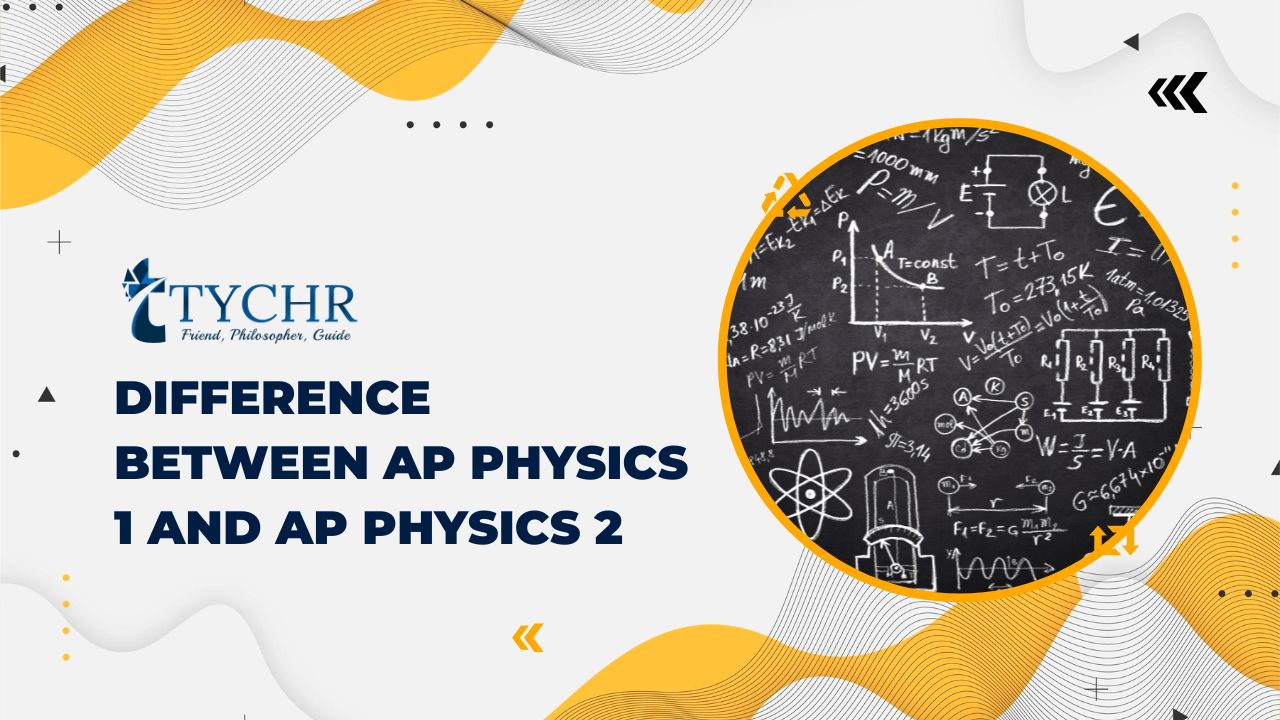Table of Contents
Advanced Placement (AP) Physics 1 and Physics 2 are college-level courses offered by the College Board. Both courses are designed to provide students with a strong foundation in the principles of physics and to prepare them for further studies in science, technology, engineering, and mathematics (STEM) fields. AP Physics 1 and Physics 2 are the first two courses in a four-course sequence that culminates with AP Physics C: Mechanics and AP Physics C: Electricity and Magnetism.
AP Physics 1 is an algebra-based course that covers topics such as kinematics, dynamics, energy, momentum, rotational motion, and waves. The course is designed to develop students’ conceptual understanding of physics principles and to help them apply those principles to solve problems. AP Physics 1 does not require any prior physics knowledge and is suitable for students who have completed Algebra 2.
AP Physics 2, on the other hand, is also an algebra-based course that covers topics such as fluid mechanics, thermodynamics, electricity, magnetism, optics, and modern physics. The course builds on the concepts learned in AP Physics 1 and is designed to deepen students’ understanding of physics principles and to help them develop their problem-solving skills. AP Physics 2 is more challenging than AP Physics 1 and is suitable for students who have completed AP Physics 1 or an equivalent course.
Difference in Subject Content
One of the major differences between AP Physics 1 and Physics 2 is the subject content. While both courses cover the fundamentals of physics, Physics 2 covers a wider range of topics and goes into more depth than Physics 1. Physics 2 covers topics such as electricity, magnetism, thermodynamics, and optics, which are not covered in AP Physics 1. Additionally, Physics 2 also covers modern physics topics such as quantum mechanics and special relativity.
Assessment Pattern and Kind of Questions Asked
The assessment pattern for AP Physics 1 and Physics 2 is similar, with both courses having a multiple-choice section and a free-response section. The multiple-choice section tests students’ knowledge of physics concepts and principles, while the free-response section tests their problem-solving skills. However, the questions in Physics 2 are generally more challenging than those in Physics 1, requiring students to apply their knowledge of physics principles to solve complex problems.
The kind of questions asked in AP Physics 1 and Physics 2 also differs. AP Physics 1 focuses more on conceptual understanding and requires students to apply physics principles to solve simple problems. In contrast, Physics 2 requires students to apply physics principles to solve complex, real-world problems. The free-response questions in Physics 2 often require students to analyze data, design experiments, and write detailed explanations.
Also Read: Everything You Need To Know About AP Physics C Mechanics
AP Physics 1 Assessment Topics:
- Kinematics: Kinematics is the study of motion without considering the forces that cause the motion. The assessment for AP Physics 1 includes questions on topics such as displacement, velocity, acceleration, and projectile motion.
- Dynamics: Dynamics is the study of motion and the forces that cause it. The assessment for AP Physics 1 includes questions on topics such as force, mass, acceleration, and friction.
- Energy: Energy is the ability to do work, and it can take many forms such as kinetic energy, potential energy, and thermal energy. The assessment for AP Physics 1 includes questions on topics such as conservation of energy, work, power, and simple machines.
- Momentum: Momentum is the product of mass and velocity and is conserved in a closed system. The assessment for AP Physics 1 includes questions on topics such as conservation of momentum, collisions, and impulse.
- Waves: Waves are disturbances that travel through a medium and can take many forms such as sound waves and light waves. The assessment for AP Physics 1 includes questions on topics such as wave properties, interference, and standing waves.
AP Physics 2 Assessment Topics:
- Fluids: Fluids are substances that flow and take the shape of their container. The assessment for AP Physics 2 includes questions on topics such as pressure, buoyancy, and fluid dynamics.
- Thermodynamics: Thermodynamics is the study of the relationship between heat and other forms of energy. The assessment for AP Physics 2 includes questions on topics such as temperature, heat transfer, and thermodynamic processes.
- Electricity and Magnetism: Electricity and magnetism are closely related phenomena that are essential to many aspects of modern technology. The assessment for AP Physics 2 includes questions on topics such as electric fields, electric potential, circuits, and magnetic fields.
- Optics: Optics is the study of light and its behavior. The assessment for AP Physics 2 includes questions on topics such as reflection, refraction, lenses, and diffraction.
- Modern Physics: Modern physics is the study of physics beyond the classical theories of Isaac Newton and Albert Einstein. The assessment for AP Physics 2 includes questions on topics such as quantum mechanics, special relativity, and nuclear physics.
It is important to note that the topics covered in AP Physics 1 and Physics 2 assessments are not exclusive to those listed above. The College Board’s Course and Exam Description outlines the full scope of each course, including the topics that may appear on assessments. Students are encouraged to review the Course and Exam Description and to work through practice questions to prepare for the assessments. By mastering the topics listed above, students will be well-prepared for the assessments and for further studies in physics and STEM fields.

Who should take AP Physics 1 and Physics 2?
AP Physics 1 is suitable for students who have a strong background in mathematics and are interested in learning the fundamental principles of physics. It is also suitable for students who plan to major in non-STEM fields but still want to learn about physics. AP Physics 1 is a good option for students who have not taken any physics courses before and want to test their interest in the subject.
Physics 2, on the other hand, is suitable for students who have a strong interest in physics and want to deepen their understanding of the subject. It is also suitable for students who plan to major in STEM fields and want to take a more challenging physics course. Physics 2 is a good option for students who have taken AP Physics 1 or an equivalent course and want to further develop their problem-solving skills.
Career Options – Students who take AP Physics 1 and Physics 2 have a wide range of career options available to them.
- Those who complete AP Physics 1 may pursue careers that require a strong understanding of physics principles and the ability to apply those principles to solve real-world problems. Students who complete AP Physics 1 may also consider pursuing a degree in physics or a related field.
- Students who complete AP Physics 2 have even more career options available to them. They may pursue careers in fields such as aerospace engineering, materials science, nuclear engineering, and particle physics. These careers require a deep understanding of physics principles and the ability to apply those principles to solve complex problems. Students who complete AP Physics 2 may also consider pursuing a degree in physics, engineering, or a related field.
Here are some examples of career options for AP Physics 1 and 2:
- Engineering: AP Physics can be an excellent foundation for pursuing a career in engineering, as it provides students with a strong understanding of fundamental physics concepts that are used in engineering design and analysis. With further studies, students can specialize in mechanical, electrical, or civil engineering, among others.
- Aerospace and Defense: AP Physics 2 can also prepare students for a career in aerospace and defense, where they may work on developing and testing new technologies for space exploration, missile defense, or military applications.
- Research: The AP 1 Physics course’s laboratory work, critical thinking, and problem-solving skills can prepare students for careers in scientific research, such as physics, astrophysics, materials science, and environmental science. However, AP 2 Physics students with a strong background in physics can pursue a career in scientific research, working in fields such as astrophysics, nuclear physics, or materials science.
- Medical Physics: Medical physics is a specialized field that applies physics principles and techniques to the diagnosis and treatment of diseases, including cancer. AP Physics 1 and 2 can provide a solid foundation for pursuing a career in medical physics.
- Education: Students who have a passion for teaching and a strong understanding of physics concepts can consider a career in education, such as becoming a high school physics teacher or a college professor.
- Computer Science: Physics concepts are often used in computer science, particularly in areas like simulations, machine learning, and robotics.
In conclusion, AP Physics 1 and Physics 2 are both excellent courses for students who are interested in physics and want to deepen their understanding of the subject. AP Physics 1 is suitable for students who are new to physics and want to learn the fundamental principles, while Physics 2 is suitable for students who have already taken AP Physics 1 or an equivalent course and want to further develop their problem-solving skills. Both courses provide students with a strong foundation in physics and prepare them for further studies in STEM fields. Students who complete these courses have a wide range of career options available to them and may consider pursuing a degree in physics, engineering, or a related field.







